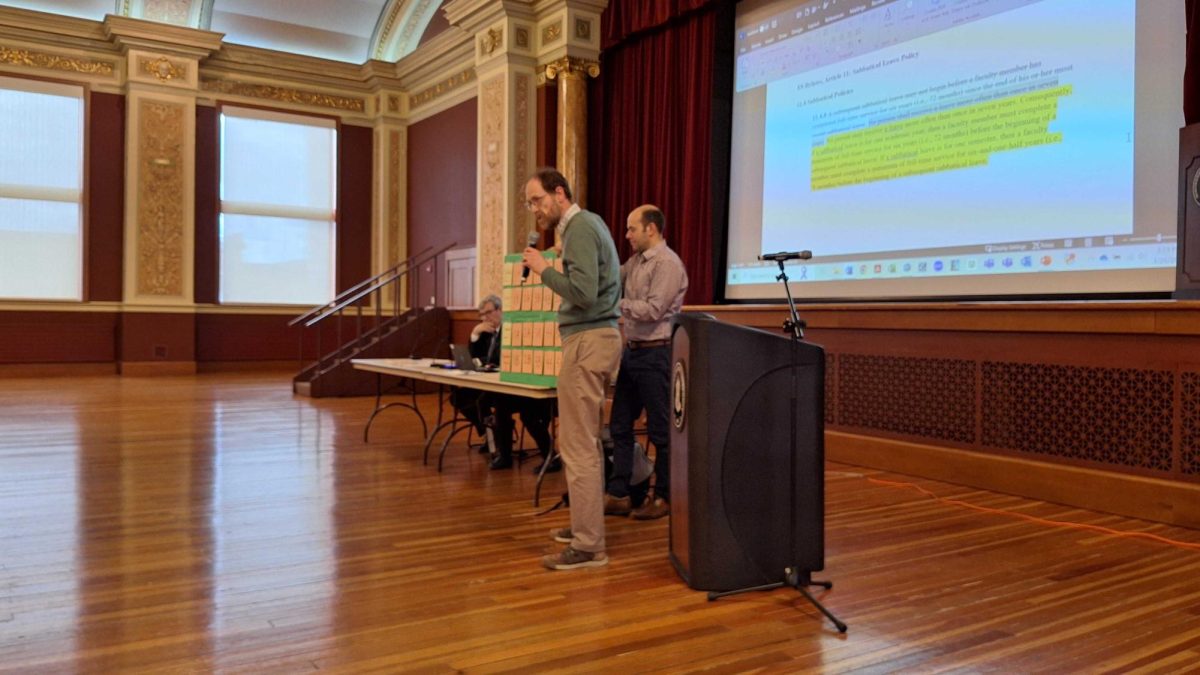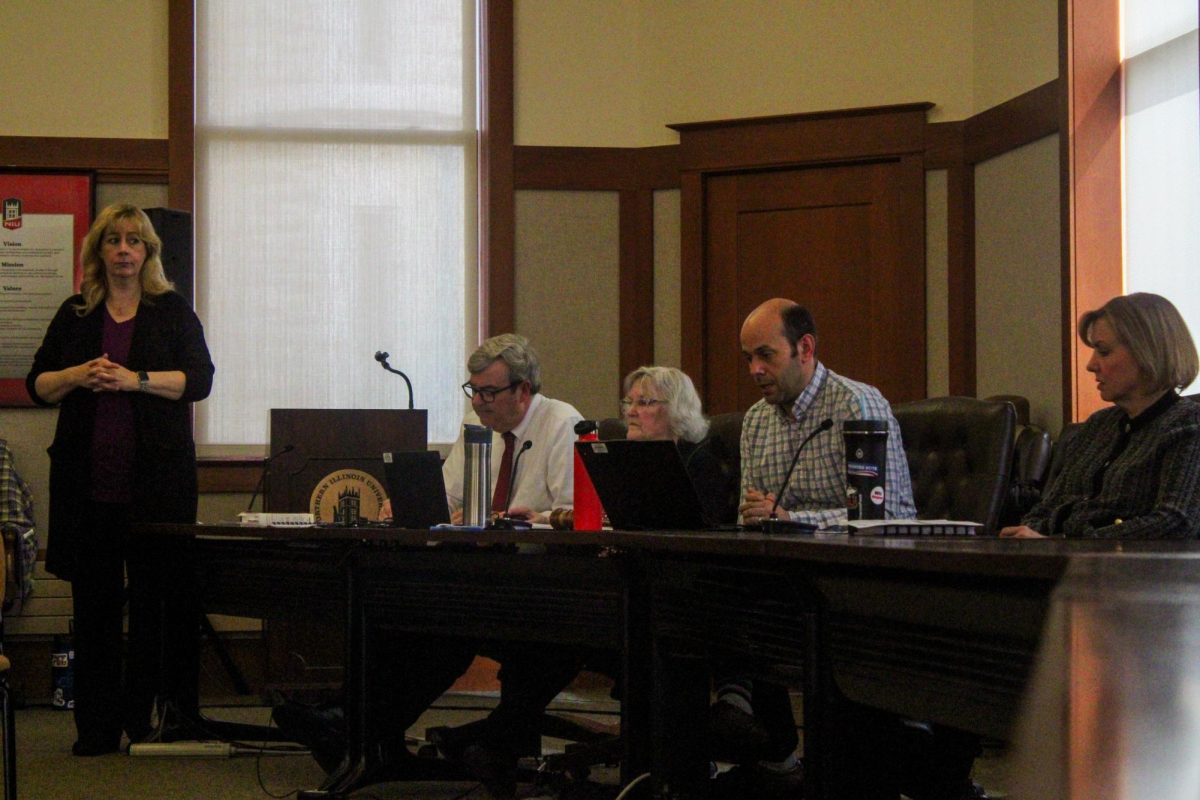DeKALB – NIU’s CFO said university divisions have begun the process of categorizing their expenses by priority level at the Faculty Senate’s meeting on Wednesday.
BUDGET PROCESS AND TIMELINE
University officials provided an update on the progress of the new budgeting approach the university is using to reduce its budget deficit.
NIU Vice President and Provost Laurie Elish Piper said the university is making sure their budget is in alignment with the university’s vision and priorities of divisions.
“We’re making sure that in resource constrained times, we’re using those resources to invest in those most important priorities, keeping that frame of reference top of mind throughout the process,” Elish Piper said. “Thinking about ways that we can redesign or reorganize things to be more efficient, all of those things are top of mind as we go through the budget process.”
NIU has traditionally used an incremental budgeting system which requires only marginal changes to the budget at the start of each fiscal year.
The zero-based budgeting method, set to begin in Fiscal Year 2026, requires a justification for every expense starting from a “zero-base” at the beginning of the fiscal year.
Instead of each division being guaranteed a set amount of money at the beginning of the fiscal year, the budget starts at $0 and any money allocation afterward must be justified.
As of FY’25 NIU’s total budget is $423.9 million.
Elish-Piper said the university is asking divisions to think about the criticality of the budget items they are asking for.
The categories used will be high impact, moderate impact and low impact.
“That prioritization process is a new element that’s been added into the budget process that will guide our decisions and guide our thinking to ensure we are aligning our resources with those priorities,” Elish-Piper said.
Elish-Piper said expenses required for compliance, accreditation or items core to the university’s mission should be placed at the highest priority level.
According to a presentation shown at the meeting, high impact refers to anything which substantially increases efficiency, reduces costs or improves student outcomes, moderates impact delivers incremental change, but is not essential and low impact refers to things that the university would like to have, but have limited justification for their implementation.
NIU has vowed to reduce its deficit to zero by FY26. This deficit currently sits at around $15.4 million for FY25, down 52% from FY24’s $32.2 million.
Divisions have received “decision packets” which will be submitted to and checked by the Budget Office, according to NIU Chief Financial Officer George Middlemist.
The president, provost, and CFO plan to create options based on what is submitted by each division.
Middlemist said from late April until early June, the budget will undergo review by the president, provost, chief financial officer, chief strategy officer, chief human resource officer and chief communications officer.
Budget scenarios will be provided to the deans and the Resource Space and Budget Committee (RSBC). By June 9, the budget will be posted to the NIU website and by June 12, it will be considered for approval by the Board of Trustees.
UNCERTAINTY UNDER NEW FEDERAL ADMINISTRATION
Faculty Senate President Benjamin Creed said he is advocating for academic freedom after hearing concerns from faculty about potential changes that may impact higher education.
Creed said actions taken out of compliance with laws and regulations were understandable.
“The thing I’ve been hearing from faculty as a concern is that fear is guiding some of the changes that have been going on,” Creed said. “Fear should not be the basis of our changes. We should not allow fear alone to be the reason why we make changes.”
Creed said his message applied to faculty, staff, students and senior leadership.
“We should not allow that uncertainty to provide cover for changes or to walk away from the work,” Creed said.
Creed said consistent communication was important to prevent speculation about why changes are made from spreading.
“I want to echo the words of leaders from across the country inside and outside of higher ed which strongly call on campuses to avoid anticipatory compliance,” Creed said. “Where there’s changes that have been made based on longstanding efforts or are part of the core work of our campus to improve, we should highlight those changes. We should show that those changes are not just reactionary.”
FACULTY SENATE ELECTIONS
Creed was nominated to be faculty senate president for 2025-2026.
Creed was the only person nominated for the office and will need to submit a letter of acceptance for the position by April 11. The election for the office will take place at the Faculty Senate’s April 23 meeting.
SABBATICAL LEAVE POLICY CHANGE
The Faculty Senate voted in favor of changing the current language regarding the bylaws. The first vote, explained by Creed, was to “amend the appeal procedures for both promotion and tenure decisions and sabbatical determinations.”
A sabbatical leave is an extended leave awarded to NIU faculty members to work on projects or to strengthen academic programs at NIU.
The second change explains that no faculty member may receive a leave more than once every seven years. If a sabbatical leave is longer than one academic year, the faculty member must work a full-time service of at least 72 months before beginning another sabbatical leave. If a sabbatical leave is for one semester, then the faculty must work a full-time service for 78 months.
The Articles 10 and 11 changes passed 41-1 and the Article 11.4.8 changes passed 37-5.
The next Faculty Senate meeting will take place on April 23.















